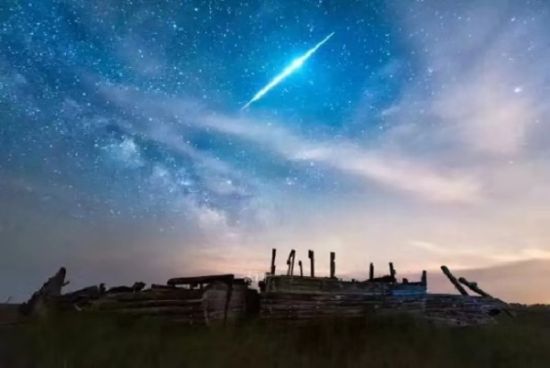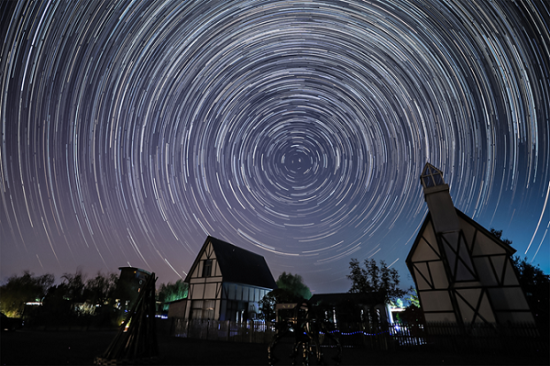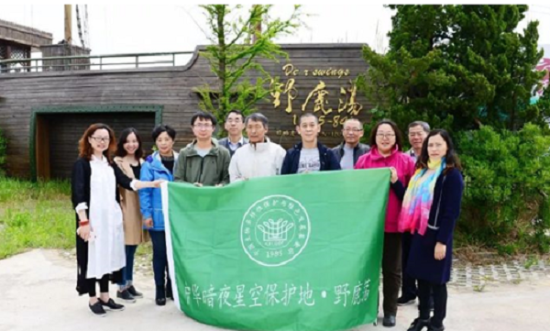Author / Li Yu
The bright night sky reappeared in China, and it is no longer a dream for people to watch the stars and watch the Galaxy. At the first session of China Conservation Areas for Night and Starry Sky conference, which opened on the 9th, relevant people gathered to discuss the effective path and development direction of the benign development of this type of conservation site, and released the China Conservation Area for Night and The Starry Sky at Yancheng Declaration and the theme song of China Night and Starry Sky Conservation - Beautiful Starry Sky, established "China Conservation Area for Night and Starry Sky Alliance", China Conservation Area for Night and Starry Sky at Yeludang is the president unit of the current alliance.
Xiao Qing, the Deputy Secretary-General of China Biodiversity Conservation and Green Development Foundation (CBCGDF) introduced: “The spread of light pollution has destroyed the natural day and night mode, changed the natural mode of the environment, and many cities have lost the environment and conditions to appreciate the beautiful starry sky. Two-thirds cities in the world have been unable to see the Milky Way.” The provinces with conditions in China actively promote the establishment of dark and starry sky conservation areas, protect areas that are seriously damaged by light pollution, protect the purity and clarity of the night sky, and let the history and culture of human beings looking up at the stars for thousands of years continue in the contemporary era.
The conference held at Yeludang in Yancheng, Jiangsu Province, includes the heads of five China Conservation Areas for Dark and Starry and Sky (CCAfa) sites (Nagqu of Tibet, Ngari of Tibet, Yeludang of Yancheng in Jiangsu, Taihang Honggu of Shanxi, and Geyuan of Shangrao in Jiangxi) and the leaders of the local government attended the meeting. The conference was co-organized by China Biodiversity Conservation and Green Development Foundation (CBCGDF), Yancheng Teachers Univesity and CBCGDF China Conservation Area for Dark and Starry Sky at Yeludang. The government leaders of Dafeng District of Yancheng came to the meeting site to support the cause of night sky protection. Experts from the National Astronomical Observatory and the Nanjing Astronomical Instrument Center of the Chinese Academy of Sciences gave a lecture. The conference discussed the scientific and orderly development of light pollution prevention and dark and starry sky protection, and promoted the enrichment, comprehensiveness and improvement of ecological and environmental protection undertakings.
According to the news from the conference, China is steadily advancing the protection of the dark and starry sky. Since the beginning of the 21st century, under the advocacy of CBCGDF, five China Conservation Area for Dark and Starry Sky (CCAfa) sites have been established, and the Action Plan for Protection Chinese Dark and Starry Sky has been formulated. Respectively attempted to carry out protection practices dark and starry sky in different regions and environments such as plateaus, coastal wetland, mountains and lakes, explore ways and methods to promote dark and starry sky protection in China, and create national model sites for dark and starry sky protection.
China Conservation Area for Dark and Starry Sky at Yeludang, Yancheng, Jiangsu located in the densely populated and economically developed Yangtze River Delta region, there is no light pollution at 26 square kilometers. Based on years of data, the region can observe an average of 238 days of dark and starry sky throughout the year. The Galaxy in summer night and the Orion constellation in winter show clear. Ma Lianyi, founder of the conservation area said: “In the city, the dark and starry sky has become a scarce resource. Therefore, establishing China Conservation Area for Dark and Starry Sky here has a better social education significance.” He hopes to use the cooperation between the CCAfa sites to preserve a clear sky for future generations.
Yeludang is a workplace that Ma Lianyi applied for in order to protect and study biological remains in 2009. According to the survey and observation, the quality of the night sky in the Yeludang area is in good condition, and the visual view of the Milky Way in summer, the Orion constellation in winter, and the main constellation of the area are clearly visible. Yeludang has a core experience area of 3,000 acres, which is much higher than the area standard required for CCAfa for dark and starry sky. In order to promote the process of dark and starry sky protection, this area will build facilities such as the beautiful starry sky literary society, the starry sky observatory, and the cabin for stargazers. At the same time, it will also establish wildlife protection sites and prepare to build biological life gene banks. At present, the Humanities and Nature Comprehensive Experimental Base of Yancheng Teachers University has been unveiled there.
Professor Tang Boping, director of the Jiangsu Provincial Key Laboratory of Bioresources and Environmental Protection, said: The China Conservation Area for Dark and Starry Sky at Yeludang is an important scientific popularization and research platform. In the future, this CCAfa will be used as a platform to build a base for ecological advocacy and scientific popularization, and carry out various special activities to make the conservation area a veritable scientific comprehensive experimental base that combines scientific exploration, cultural creation and ecological advocacy, to improve the scientific literacy and living standards of the whole people.




(Photo credit: Yang Guomei, Cui Jianling, Feng Haoping)
Original Chinese article:
http://www.sh.chinanews.com/chanjing/2019-11-11/66270.shtml
By / Maggie
